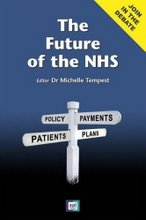
This is a summary of chapter 34 - The Case for Pluralism. It was written by Professor Nick Bosanquet and Andrew Haldenby. Professor Nick Bosanquet is a Professor of Health Policy at Imperial College, London and a health economist who first carried out research on NHS funding in the 1980’s for the York Reports sponsored by the British Med ical Association, the Royal College of Nursing and the Institute for Health Services Management. He has been Special Adviser on public expenditure to the Commons Health Committee since 2000. He is a non-Executive Director of a Primary Care Trust in London. Mr Andrew Haldenby is the Director of Reform, an independent, non-party think tank whose mission is to set out a better way to deliver public services and economic prosperity.
ical Association, the Royal College of Nursing and the Institute for Health Services Management. He has been Special Adviser on public expenditure to the Commons Health Committee since 2000. He is a non-Executive Director of a Primary Care Trust in London. Mr Andrew Haldenby is the Director of Reform, an independent, non-party think tank whose mission is to set out a better way to deliver public services and economic prosperity.
In this chapter they put the case for a full move towards pluralism. They explain that if the private sector are rewarded for using capacity; markets grow and market expansion raises productivity and prices fall. The public sector currently lacks this dynamic.
 ical Association, the Royal College of Nursing and the Institute for Health Services Management. He has been Special Adviser on public expenditure to the Commons Health Committee since 2000. He is a non-Executive Director of a Primary Care Trust in London. Mr Andrew Haldenby is the Director of Reform, an independent, non-party think tank whose mission is to set out a better way to deliver public services and economic prosperity.
ical Association, the Royal College of Nursing and the Institute for Health Services Management. He has been Special Adviser on public expenditure to the Commons Health Committee since 2000. He is a non-Executive Director of a Primary Care Trust in London. Mr Andrew Haldenby is the Director of Reform, an independent, non-party think tank whose mission is to set out a better way to deliver public services and economic prosperity.In this chapter they put the case for a full move towards pluralism. They explain that if the private sector are rewarded for using capacity; markets grow and market expansion raises productivity and prices fall. The public sector currently lacks this dynamic.
They highlight that in the NHS, capacity is used to limit demand, rather than ‘excess’ capacity being used to meet demand and provide more. They believe waiting lists are the consequence. They think that liberalising the supply side will both cause more capacity and improve efficiency. Also effective use of the private sector can be made when it is free to supply in a competitive environment, so that it invests, innovates and responds to consumers. It discusses the need for greater competition to make pluralism work and they list four key elements for effective pluralism:
1) Increasing information about choice.
2) Developing the market for alternative supply.
3) Recognising that reform through supply pluralism will take substantial launch costs.
4) Supply pluralism would be greatly assisted by a wider use of advertising.
They explain that real reform must also extend to demand as well as supply and suggest the NHS requires an environment where there are independent sources of funding. They summarise with the thought that without change in funding of the NHS, any ‘supply side only’ reform is likely to run into new problems of rationing as improvements increase the demand for services.
1) Increasing information about choice.
2) Developing the market for alternative supply.
3) Recognising that reform through supply pluralism will take substantial launch costs.
4) Supply pluralism would be greatly assisted by a wider use of advertising.
They explain that real reform must also extend to demand as well as supply and suggest the NHS requires an environment where there are independent sources of funding. They summarise with the thought that without change in funding of the NHS, any ‘supply side only’ reform is likely to run into new problems of rationing as improvements increase the demand for services.
To comment further on this please do post here, after reading the chapter in the book, or join the debate on www.thefutureofthenhs.com




1 comment:
Interesting.
Post a Comment